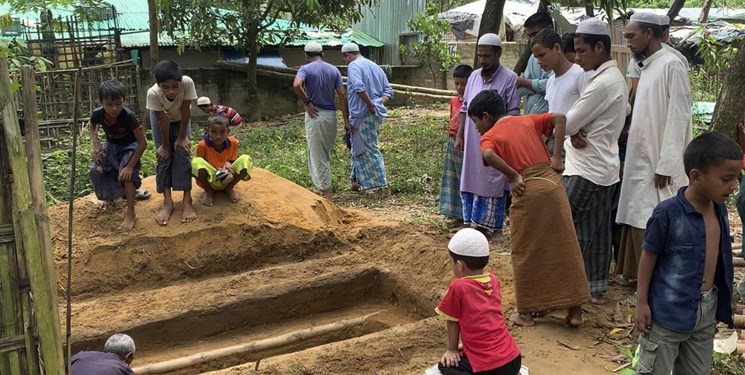Rights Groups Urge Full Probe into Rohingya Leader’s Killing

Rights groups called for an investigation into the killing of a prominent Rohingya leader who was shot to death at the world’s largest refugee camp in Bangladesh.
Mohibullah, who was in his late 40s and had eight children, was killed by unknown gunmen in a camp in Cox’s Bazar on Wednesday night. He led one of the largest community groups to emerge since more than 730,000 Rohingya fled Myanmar after a military crackdown against the Muslim-majority minority in August 2017, Al-Jazeera reported.
“He left me with so much responsibility,” his wife, Nasima Begum, told Al-Jazeera, adding, “I am devastated, how can I manage the family now? It’s a difficult road ahead. I am scared to live here now, we need security.”
Al-Jazeera’s Tanvir Chowdhury, reporting from the site where Mohibullah was shot dead, said there was “an uneasy calm prevailing in the camp and a heavy security presence”.
“Rohingya refugees are worried and anxious to find out who is behind the killing,” Chowdhury added.
Mohammad Qasim, a Rohingya refugee, could not hold back his tears.
“For years now, we have been watching and following Mohibullah, he was a gem to us and done so much for us, but we couldn’t save him,” he told Al-Jazeera, adding, “He took our case to the global community to seek justice for us.”
Mohibullah came to prominence when he was chosen to represent his community on a visit to meet then-US President Donald Trump at the White House and attend a UN Human Rights Council session in Geneva in 2019.
Human Rights Watch called Mohibullah a vital voice for the Rohingya community.
“He always defended the rights of the Rohingya to safe and dignified returns and to have a say in the decisions concerning their lives and future. His killing is a stark demonstration of the risks faced by those in the camps who speak up for freedom and against violence,” Meenakshi Ganguly, the rights group’s South Asia director, said in a statement.
“Mohibullah’s death undermines not only the struggle of Rohingya refugees for greater rights and protection in the refugee camps, but also their efforts to safely return to their homes in Myanmar. Bangladesh authorities should urgently investigate Mohibullah’s killing along with other attacks on Rohingya activists in the camps,” she said.
Amnesty International also condemned the killing and urged Bangladeshi authorities and the United Nations refugee agency to work together to ensure the protection of people in the camps, including refugees, activists and humanitarian workers from both the Rohingya and local community, many of whom have shared concerns about their safety.
“Violence in the refugee camps in Cox’s Bazar has been a growing problem,” said Saad Hammadi, Amnesty’s South Asia campaigner, adding, “Armed groups operating drug cartels have killed people and held hostages. The authorities must take immediate action to prevent further bloodshed.”
Mohibullah was known as a moderate who advocated for the Rohingya to return to Myanmar with rights they were denied during decades of persecution.
He was the leader of the Arakan Rohingya Society for Peace and Human Rights, founded in 2017 to document atrocities against Rohingya in their native Myanmar and give them a voice in international talks about their future.
But his high profile made him a target of hardliners and he received death threats, he told Reuters news agency in 2019.
“If I die, I’m fine. I will give my life,” he said at the time.
Bangladesh’s government has pledged to take action against Mohibullah’s killers.
“The government will take stern action against those who were involved in the killing. No one will be spared,” Foreign Minister A K Abdul Momen said in his first comment since the killing.
Momen said in a statement that “vested” interests were responsible for the killing as Mohibullah had wanted to return to Myanmar.
“The killers of Mohibullah must be brought to justice,” Momen added.
Police say the murder was well planned and on Friday, detained a suspect in the case.
“All police units are involved in resolving this case and finding the motive behind it,” said Naimul Haq, the commanding officer of the 14 Armed Police Battalion, adding, “Hopefully, we will resolve this case soon.”
The killing has ignited grief and anger in the camps where some residents say it is the latest evidence of mounting violence as armed gangs vie for power.
In a video circulated on social media, Mohibullah’s brother, Habibullah, who said he witnessed the shooting, blamed the Arakan Rohingya Salvation Army, an armed group active in the camps.
“They killed him as he is the leader and all Rohingya abide by him,” Habibullah said.
Before opening fire, “They said he cannot be a leader of Rohingya and there cannot be any leaders for Rohingya”, he said.
His account could not independently be verified.
ARSA said in a post on Twitter on Friday that it was “shocked and saddened” by the killing and decried “finger-pointing with baseless and hearsay accusations”.
More than a million Rohingya live in the camps, the vast majority having fled neighbouring Myanmar during the military crackdown that UN investigators have said was carried out with genocidal intent.
Myanmar denies committing genocide, saying it was waging a legitimate campaign against armed fighters who attacked police posts.







